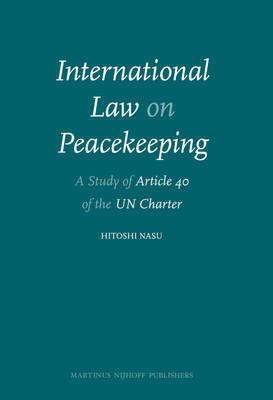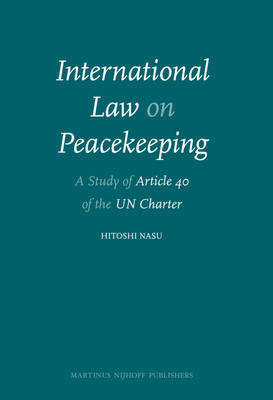
- Afhalen na 1 uur in een winkel met voorraad
- Gratis thuislevering in België vanaf € 30
- Ruim aanbod met 7 miljoen producten
- Afhalen na 1 uur in een winkel met voorraad
- Gratis thuislevering in België vanaf € 30
- Ruim aanbod met 7 miljoen producten
Zoeken
International Law on Peacekeeping
A Study of Article 40 of the UN Charter
Hitoshi Nasu
Hardcover | Engels
€ 323,95
+ 647 punten
Omschrijving
It is generally considered that the UN Security Council has been galvanised since the end of the Cold War. However, the existence and development of armed conflicts remain the reality in the international scene. Is the upsurge in instances of invoking Chapter VII of the UN Charter truly a sign of the invigoration of the Security Council's authority or mere evidence of its failure to prevent the aggravation of armed conflicts? To what extent is the Security Council authorised to exercise the peacekeeping power in order to take a more flexible approach to conflict management from an earlier stage of conflict?
This book explores the potential of the UN peacekeeping power, placing Article 40 of the UN Charter at the centre of the legal regime governing peacekeeping measures. It traces the origins of peacekeeping measures primarily in the experience of the League of Nations and identifies Article 40 of the Charter as the primary legal basis for, and the legal restraints upon, the exercise of the peacekeeping power. It examines the regulatory framework within which the United Nations, particularly the Security Council, is authorised and may even be required to direct peacekeeping measures to prevent the aggravation of armed conflicts. It suggests that the legal accountability of the Security Council in directing peacekeeping measures will be enhanced by utilising procedural mechanisms for self-regulation
This book explores the potential of the UN peacekeeping power, placing Article 40 of the UN Charter at the centre of the legal regime governing peacekeeping measures. It traces the origins of peacekeeping measures primarily in the experience of the League of Nations and identifies Article 40 of the Charter as the primary legal basis for, and the legal restraints upon, the exercise of the peacekeeping power. It examines the regulatory framework within which the United Nations, particularly the Security Council, is authorised and may even be required to direct peacekeeping measures to prevent the aggravation of armed conflicts. It suggests that the legal accountability of the Security Council in directing peacekeeping measures will be enhanced by utilising procedural mechanisms for self-regulation
Specificaties
Betrokkenen
- Auteur(s):
- Uitgeverij:
Inhoud
- Aantal bladzijden:
- 322
- Taal:
- Engels
Eigenschappen
- Productcode (EAN):
- 9789004172265
- Verschijningsdatum:
- 26/01/2009
- Uitvoering:
- Hardcover
- Formaat:
- Genaaid
- Afmetingen:
- 168 mm x 244 mm
- Gewicht:
- 748 g

Alleen bij Standaard Boekhandel
+ 647 punten op je klantenkaart van Standaard Boekhandel
Beoordelingen
We publiceren alleen reviews die voldoen aan de voorwaarden voor reviews. Bekijk onze voorwaarden voor reviews.











